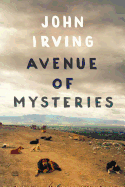 Before retiring executive director Hut Landon handed over his light saber to successor Calvin Crosby at last week's Northern California Independent Booksellers Association trade show in South San Francisco, Landon reiterated his long-held belief: the yearly event is actually a family reunion. It was a theme echoed again and again by both bookseller attendees and nearly 50 authors featured on the program over the course of two days.
Before retiring executive director Hut Landon handed over his light saber to successor Calvin Crosby at last week's Northern California Independent Booksellers Association trade show in South San Francisco, Landon reiterated his long-held belief: the yearly event is actually a family reunion. It was a theme echoed again and again by both bookseller attendees and nearly 50 authors featured on the program over the course of two days.
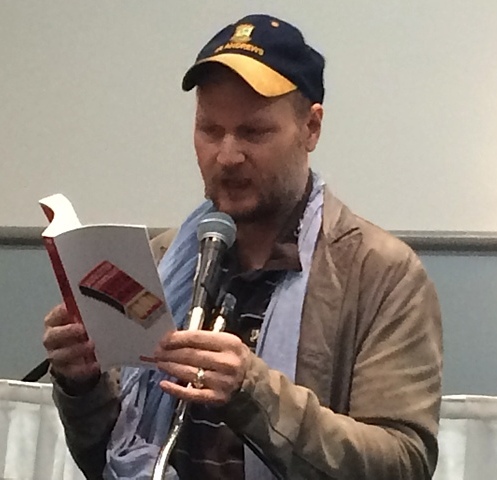 |
| Augusten Burroughs reads from Lust & Wonder, which picks up where Dry left off. |
"It's good to be back home," declared Augusten Burroughs at the opening session. Reading from his forthcoming memoir Lust & Wonder (St. Martin's, March 2016), Burroughs shared that at 19, he came to the City by the Bay, which felt as if it tucked him in at night after being a "f*ck-up in every way." He said that he did not have any bad memories of San Francisco, except when his mother came to visit and tried to get a job at the ad agency where he worked in the 1980s. "I will never forget the surprise of San Francisco," said the writer, who now lives with his husband in a 200-year-old home in Connecticut.
At a luncheon that day, Charlie Jane Anders recalled doing a "Chocolate Crawl" of indie stores, then talked about All the Birds in the Sky (Tor, January 2016), about a mad scientist and a witch. She thought it was going to be a "genre mash-up" but it turned into a relationship book as she got deeper into it: "I hope there's a lot of emotional stuff in the book as much as the cool magical stuff."
Antonia Hayes, an Australian-born author whose debut novel, Relativity (Gallery, May 2016), has been praised by The Rosie Project author Graeme Simsion, talked about her first job, as a teenage bookseller. "It's really weird to be here as an author, because I really think of myself as a bookseller at heart." Hayes said her novel is based on her own experience as a 19-year-old single mom whose son suffered "shaken baby syndrome" at the hands of his biological father. She noted that she typed the words "the end" on the manuscript just as the café at Borderland Books was closing.
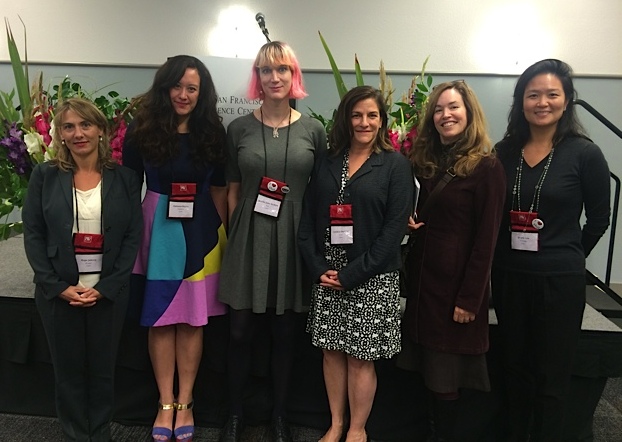 |
| Hope Jahren, Antonia Hayes, Charlie Jane Anders, Cynthia Sweeney, Elizabeth McKenzie and Janice Y.K. Lee served up lots of insider info about their books at the Author Buzz lunch. |
Next up was Hope Jahren, who charmingly admitted she is not a writer but a scientist. Women scientists, she said, are rare, and no one really knows how to encourage more women to enter the sciences. Even Lego has tried to make science appealing to girls with a couple of toys she held up. "I played with them for a few hours, and it was kind of fun," she said, "but I thought, 'this is not what it is like.' " To be a woman scientist, she said, you need a "strong back, a big heart and a good friend," and "you don't have to be made of plastic, you have to be real." Lab Girl (Knopf, April 2016) is her story.
Although she is of Korean descent, Janice Y.K. Lee was born and raised in Hong Kong, sent to the U.S. for boarding school and college, moved to New York to be a books editor at Elle, and found herself as the "trailing spouse" when her husband relocated their growing family to Hong Kong for his work. "People do different things," she said, to adjust to a new life with a housekeeper, driver and other staff. "I finished my novel." The Expatriates (Viking, January 2016) is about a group of expat women in Hong Kong--and even though Lee has since returned to live in New York with her family--she said her Hong Kong friends are a bit nervous about her book.
Elizabeth McKenzie said her latest novel, The Portable Veblen (Penguin, January 2016), was inspired by the unnecessary suffering she witnessed her father go through as part of the clinical medical trial that was more about the doctor behind it than healing people. The author held up a Roz Chast New Yorker cartoon that depicts the "corner of irate and insane," which is a place she often finds herself.
The last luncheon speaker, Cynthia Sweeney, said she was inspired to write The Nest (Ecco, March 2016) while she was in New York City on her way to a family brunch where a drama she might have instigated was going to be addressed. She thought she'd pop into a bar on her way, where she'd not be surprised to find one of her siblings doing the same. "I'm fascinated by adult siblings," she said. "The thing we all inherit just by being born is a family narrative." And, she added, we have no control over what the story is and who else is part of it.
Things got animated--as you might expect--at the children's authors tea, where Dav Pilkey, author of 60 books for kids, including the forthcoming 12th Captain Underpants title from Scholastic, shared that he went from being a dyslexic kid with ADHD to the illustrator of comics beloved by his classmates but not his teacher. His mom--who along with his father supported the young Dav reading anything he wanted to--told him to turn his teacher's negative into a positive. "Now, everyone loves Captain Underpants," he joked, adding that he thinks it's a badge of honor to be the #1 banned book for the past two years.
Katherine Applegate has written numerous books for children, including The One and Only Ivan, which is being made into a film. Crenshaw (Feiwel & Friends, September) is about the unexpected return of an imaginary friend--in this case a giant cat named Crenshaw who shows up as Jackson enters fifth grade amid his parents' economic struggles. "When you start talking about money, it pushes lots of people's buttons," Applegate said. "I wanted people to have a story they could hand to kids like Jackson, who doesn't know his family is 'the working poor,' or 'food insecure.' " But, she said, the book is also for children who are overwhelmed by other kids going hungry.
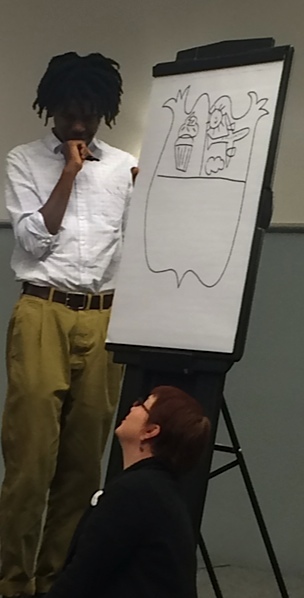 |
| Illustrator Christian Robinson creates a coat of arms for birthday girl Roz Hilden from Scholastic. |
Christian Robinson, the illustrator of Leo: A Ghost Story (Chronicle, August), told the booksellers about growing up with his grandmother in Los Angeles, where they did not have much but he always had crayons. Leo, the titular ghost, thinks the girl who moves into the house he haunts is actually his imaginary friend. Because Jane goes on to give Leo his own family tree and make him a knight, Robinson decided to do the same for a volunteer--the audience immediately offered Scholastic rep Roz Hilden, who was celebrating her birthday, for the honor.
"I feel like this is a family gathering and I'm a visiting second cousin," said Rebecca Stead, author of Goodbye Stranger (Random House Children's, August). Stead recalled going to a feminist bookstore on Amsterdam Avenue in New York City with her mother in the 1970s. Like all of her writing, Stead said, Goodbye Stranger is about questions she has--in this case, 13-year-olds who realize that friendships can end and leave an echo. As the daughter of a friend of Stead explained, at that age, "they are all changing."
At brunch the next day, Duggan McDonnell discussed Drinking the Devil's Acre: A Love Letter from San Francisco and Her Cocktails (Chronicle, September). McDonnell is a "mixologist" at Cantina, a San Francisco watering hole known for its collection of booze from around the world, but he holds a special fondness for the drinks and saloons that helped build the great City by the Bay. "I guess you'd agree with me that reading and drinking go hand in hand," he told attendees, before sharing some colorful San Francisco history told through brave barkeeps and daring drinks.
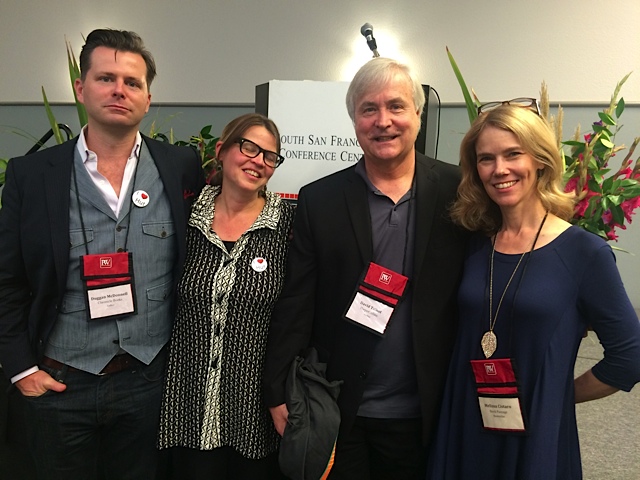 |
| Authors Duggan McDonnell, Lori Ostlund and David Talbot, with brunch host Melissa Cistaro from Book Passage, whose memoir Pieces of my Mother is due in paperback next year. |
In her new novel, After the Parade (Scribner, September), Lori Ostlund's protagonist Aaron shares much of the author's own life trajectory. She grew up in Minnesota, in a Protestant, hardware store-owning family, then moved to New Mexico and ended up in San Francisco teaching students whose first language is not English and having neighbors who fight all the time. Ostlund said she and her partner operated a furniture business for years, where she observed lonely people who came in for companionship and surprised her by sharing often very private things. "The book started with the idea of why people stay in a place and why people leave," she said.
David Talbot--whose last book, Season of the Witch: Enchantment, Terror and Deliverance in the City of Love, was a "One City, One Book" pick--believes his generation is handing over to its children a San Francisco that, despite its problems, is a "progressive beacon" to the world, but he felt less sanguine about the entire United States after 9/11. This led him to extensive research to write The Devil's Chessboard: Allen Dulles, the CIA, and the Rise of America's Secret Government (Harper, October), about an historical figure Talbot described as "Dick Cheney on steroids." Talbot had just returned from an event at Washington, D.C.'s Politics and Prose, where he had worried some CIA insiders might not like his book, but he was pleased to find they had the same concerns about the rise of a secret state and the unleashing of security watchdogs in a dangerous world. "If I was going to be whacked anywhere, I thought that might be the time," said Talbot. Although pleased with his reception in D.C., Talbot clearly enjoyed being back among his "family" of indie bookstores in the Bay Area, which he likened to his church. --Bridget Kinsella
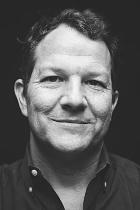 "Bookstores make artists. The ability to wander and browse. To buy not by algorithm but by whim. To be surprised by a book or a cover or a fellow browser and what he's pulling off the shelf. Record stores, bookstores and coffee shops are the holy trinity of arts incubation. And bookstores are the Father."
"Bookstores make artists. The ability to wander and browse. To buy not by algorithm but by whim. To be surprised by a book or a cover or a fellow browser and what he's pulling off the shelf. Record stores, bookstores and coffee shops are the holy trinity of arts incubation. And bookstores are the Father." 









 Before
Before 





.JPG) The Unofficial Iran Stand
The Unofficial Iran Stand


 On Friday, Fall River, Mass., Mayor Sam Sutter announced that Amazon "could be breaking ground to
On Friday, Fall River, Mass., Mayor Sam Sutter announced that Amazon "could be breaking ground to 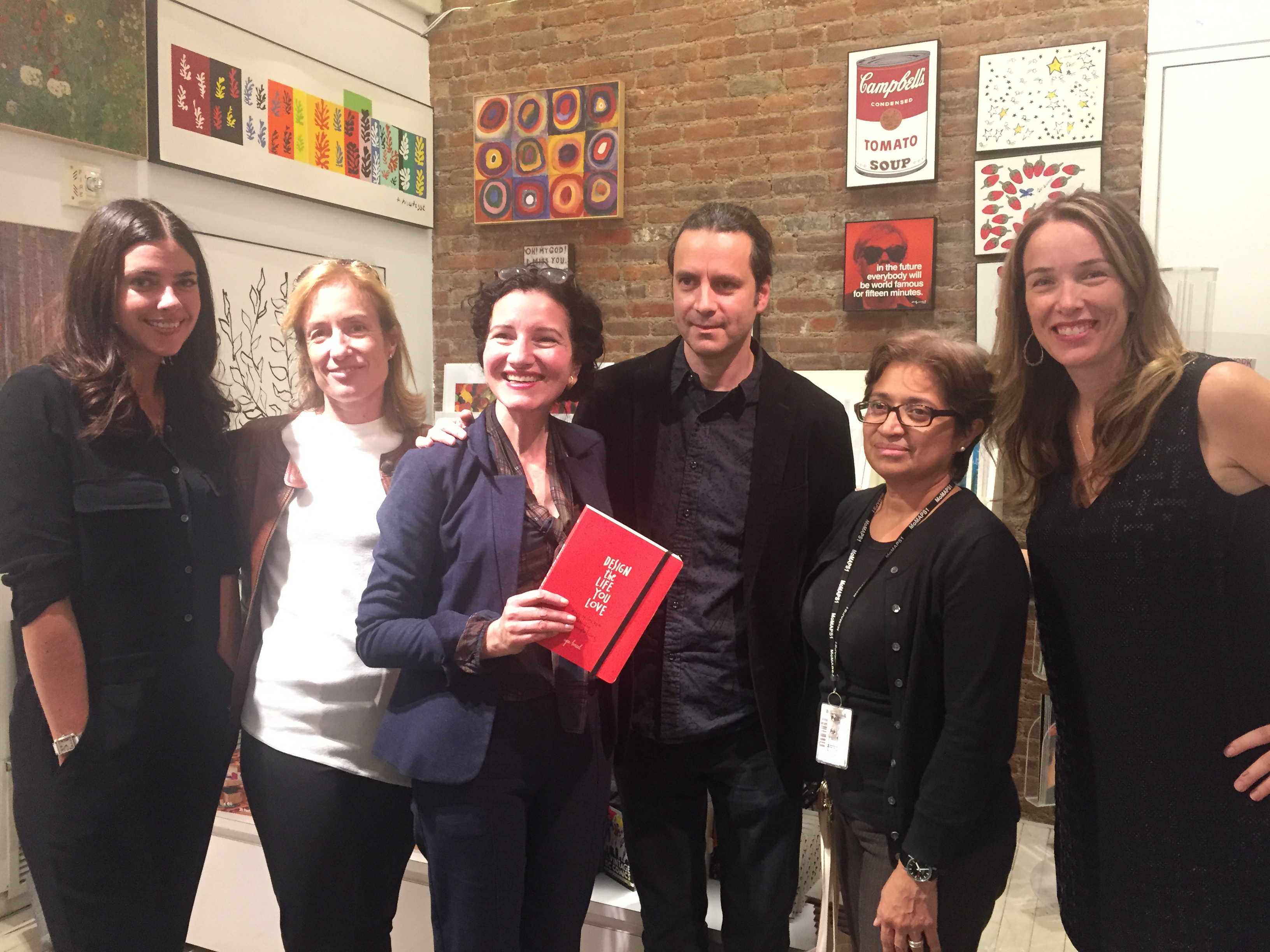 It was standing room only at the launch party for designer and author Ayse Birsel's Design the Life You Love (Ten Speed Press), at the MoMA Design Store in downtown Manhattan last Thursday evening.
It was standing room only at the launch party for designer and author Ayse Birsel's Design the Life You Love (Ten Speed Press), at the MoMA Design Store in downtown Manhattan last Thursday evening.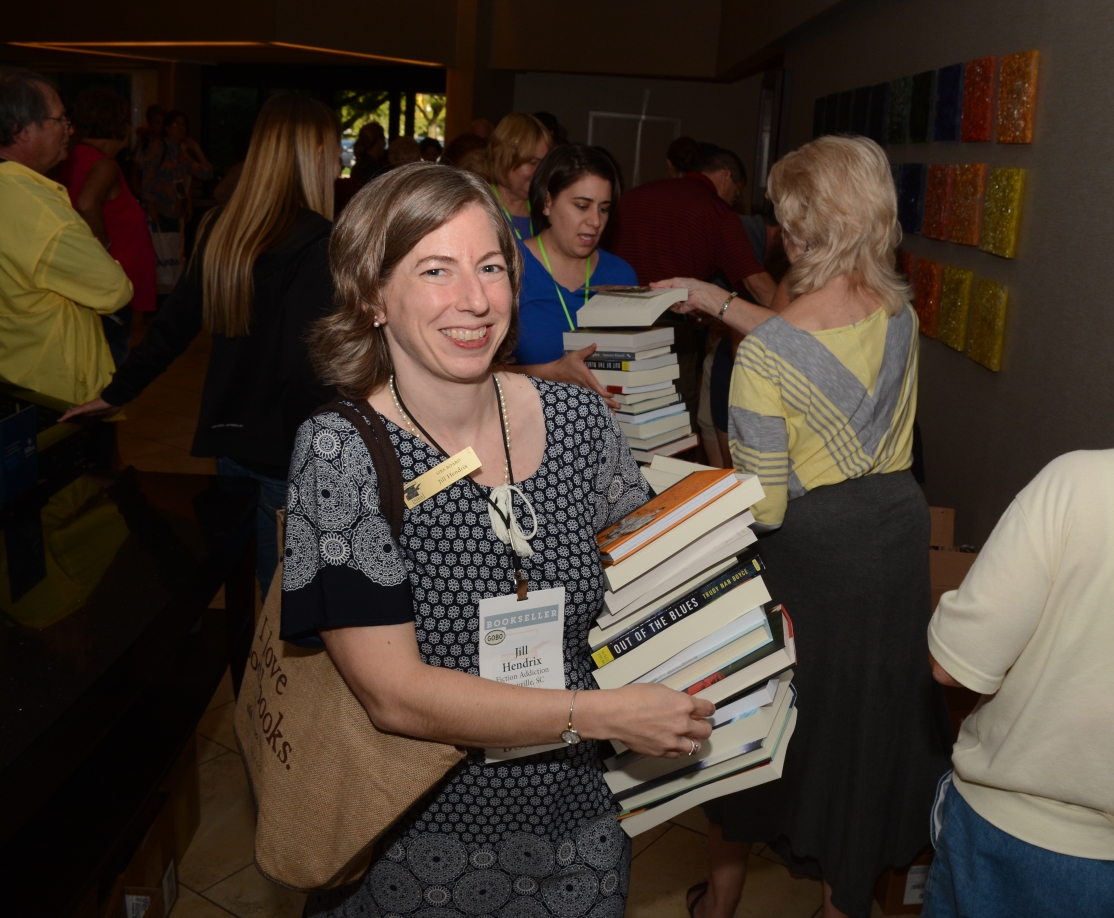
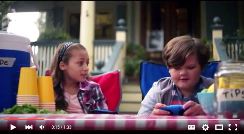 Thug Kitchen Party Grub
Thug Kitchen Party Grub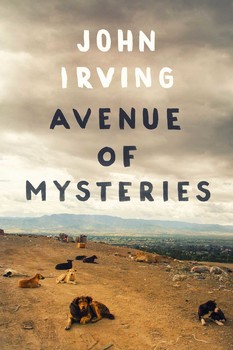 When John Irving became a finalist for the 1978 National Book Award with The World According to Garp, he leaped from mid-list, MFA-schooled, literary fiction obscurity to international fame and enough fortune thereafter to write pretty much whatever he wanted. In the almost four decades since, he has published 10 novels (including The Cider House Rules and The Fourth Hand) and has had several works adapted to film. Often long and heavily plotted, Irving's fiction regularly features troubled childhoods, violent maiming, sexual promiscuity, circuses, sports, religion, writers and writing, domesticated animals, travel and memory. Avenue of Mysteries sits right in the sweet spot of Irving's obsessions--and as with his past books, its imaginative storytelling overcomes its plot complexity and characters' often over-the-top behavior.
When John Irving became a finalist for the 1978 National Book Award with The World According to Garp, he leaped from mid-list, MFA-schooled, literary fiction obscurity to international fame and enough fortune thereafter to write pretty much whatever he wanted. In the almost four decades since, he has published 10 novels (including The Cider House Rules and The Fourth Hand) and has had several works adapted to film. Often long and heavily plotted, Irving's fiction regularly features troubled childhoods, violent maiming, sexual promiscuity, circuses, sports, religion, writers and writing, domesticated animals, travel and memory. Avenue of Mysteries sits right in the sweet spot of Irving's obsessions--and as with his past books, its imaginative storytelling overcomes its plot complexity and characters' often over-the-top behavior.